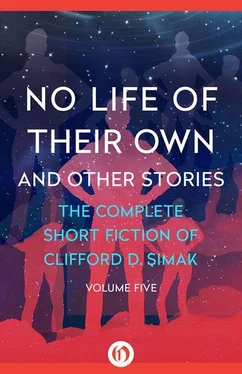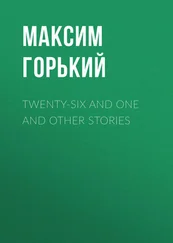Outside the grass was wet and cold with dew and he rolled up his britches so the cuffs wouldn’t get all soaked, and set off across the pasture.
Going through the woods there were some spooky places, but he wasn’t scared too badly, although no one could go through the woods at night without being scared a little.
Finally he got to the blackberry patch and stood there wondering how he could get through the patch in the dark without ripping his clothes and getting his bare feet full of thorns. And, standing there, he wondered if what he’d seen was still there and all at once he knew it was, for he felt a friendliness come from it, as if it might be telling him that it still was there and not to be afraid.
He was just a little unnerved, for he was not used to friendliness. The only friend he had was Benny Smith, who was about his age, and he only saw Benny during school and then not all the time, for Benny was sick a lot and had to stay home for days on end. And since Benny lived way over on the other side of the school district, he never saw him during vacation time at all.
By now his eyes were getting a little used to the darkness of the blackberry path and he thought that he could see the darker outline of the thing that lay in there and he tried to understand how it could feel friendly, for he was pretty sure that it was just a thing, like a wagon or a silo-filler, and nothing alive at all. If he’d thought that it was alive, he’d been really scared.
The thing kept right on feeling friendly toward him.
So he put out his hands and tried to push the bushes apart so he could squeeze in and see what it was. If he could get close to it, he thought, he could strike the matches in his pocket and get a better look at it.
“Stop,” said the friendliness and at the word he stopped, although he wasn’t sure at all that he had heard the word.
“Don’t look too closely at us,” said the friendliness, and Johnny was just a little flustered at that, for he hadn’t been looking at anything at all—not too closely, that is.
“All right,” he said. “I won’t look at you.” And he wondered if it was some sort of a game, like hide-and-seek that he played at school.
“After we get to be good friends,” said the thing to Johnny, “we can look at one another and it won’t matter then, for we’ll know what one another is like inside and not pay attention to how we look outside.”
And Johnny, standing there, thought how they must look awful, not to want him to see them, and the thing said to him, “We would look awful to you. You look awful to us.”
“Maybe, then,” said Johnny, “it’s a good thing I can’t see in the dark.”
“You can’t see in the dark?” it asked and Johnny said he couldn’t and there was silence for a while, although Johnny could hear it puzzling over how come he couldn’t see when it was dark.
Then it asked if he could do something else and he couldn’t even understand what it tried to say and finally it seemed to figure out that he couldn’t do whatever it had asked about.
“You are afraid,” said the thing. “There is no need to fear us.”
And Johnny explained that he wasn’t afraid of them, whatever they might be, because they were friendly, but that he was afraid of what might happen if Uncle Eb and Aunt Em should find he had sneaked out. So they asked him a lot about Uncle Eb and Aunt Em and he tried to explain, but they didn’t seem to understand, but seemed to think he was talking about government. He tried to explain how it really was, but he was pretty sure they didn’t understand at all.
Finally, being polite about it so he wouldn’t hurt their feelings, he said he had to leave and since he’d stayed much longer than he’d planned, he ran all the way home.
He got into the house and up to bed all right and everything was fine, but the next morning Aunt Em found the matches in his pocket and gave him a lecture about the danger of burning down the barn. To reinforce the lecture, she used a switch on his legs and try as hard as he could to be a man about it, she laid it on so hard that he jumped up and down and screamed.
He worked through the day weeding the garden and just before dark went to get the cows.
He didn’t have to go out of his way to go past the blackberry patch, for the cows were in that direction, but he knew well enough that if they hadn’t been, he’d gone out of his way, for he’d been remembering all day the friendliness he’d found there.
It was still daylight this time, just shading into night, and he could see that the thing, whatever it might be, was not alive, but simply a hunk of metal, like two sauce dishes stuck together, with a rim running around its middle just like there’d be a rim if you stuck two dishes together. It looked like old metal that had been laying around for a long time and you could see where it was pitted like a piece of machinery will get when it stands out in the weather.
It had crushed a path for quite a ways through the blackberry thicket and had plowed up the ground for twenty feet or so, and, sighting back along the way it had come, Johnny could see where it had hit and smashed the top of a tall poplar.
It spoke to him, without words, the way it had the night before, with friendliness and fellowship, although Johnny wouldn’t know that last word, never having run across it in his school books.
It said, “You may look at us a little now. Look at us quick and then away. Don’t look at us steadily. Just a quick look and then away. That way you get used to us. A little at a time.”
“Where are you?” Johnny asked.
“Right here,” they said.
“Inside of there?” asked Johnny.
“Inside of here,” they said.
“I can’t see you, then,” said Johnny. “I can’t see through metal.”
“He can’t see through metal,” said one of them.
“He can’t see when the star is gone,” said the other.
“He can’t see us, then,” they said, the both of them.
“You might come out,” said Johnny.
“We can’t come out,” they said. “We’d die if we came out.”
“I can’t ever see you, then.”
“You can’t ever see us, Johnny.”
And he stood there, feeling terribly lonely because he could never see these friends of his.
“We don’t understand who you are,” they said. “Tell us who you are.”
And because they were so kind and friendly, he told them who he was and how he was an orphan and had been taken in by his Uncle Eb and Aunt Em, who really weren’t his aunt and uncle. He didn’t tell them how Uncle Eb and Aunt Em treated him, whipping him and scolding him and sending him to bed without his supper, but this, too, was well as the things he told them, was there for them to sense and now there was more than friendliness, more than fellowship. Now there was compassion and something that was their equivalent of mother love.
“He’s just a little one,” they said, talking to one another.
They reached out to him and seemed to take him in their arms and hold him tight against them and Johnny went down on his knees without knowing it and held out his arms to the thing that lay there among the broken bushes and cried out to them, as if there was something there that he might grasp and hold—some comfort that he had always missed and longed for and now finally had found. His heart cried out the thing that he could not say, the pleading that would not pass his lips and they answered him.
“No, we’ll not leave you, Johnny. We can’t leave you, Johnny.”
“You promise?” Johnny asked.
Their voice was a little grim. “We do not need to promise, Johnny. Our machine is broken and we cannot fix it. One of us is dying and the other soon will die.”
Читать дальше












